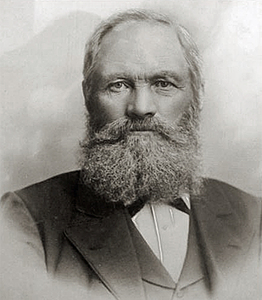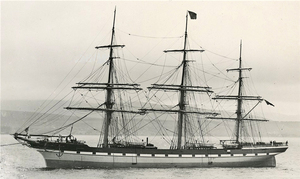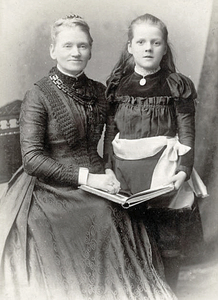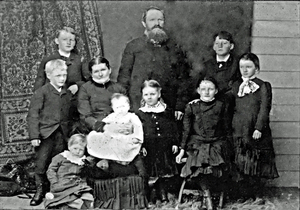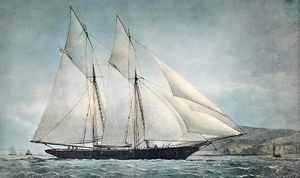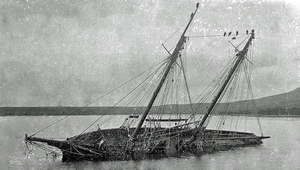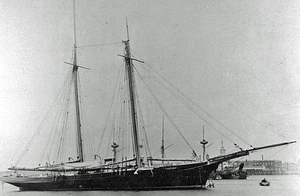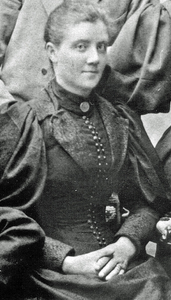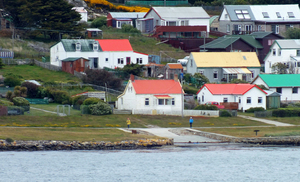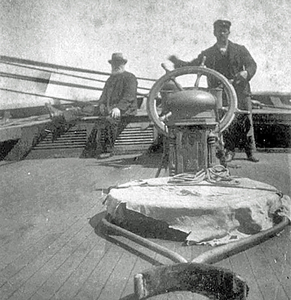ROWLANDS, FRANCIS (Frank)
1835-1919 from Falkland Islands (also Sweden)
master mariner, was born on 6 December 1835 in Kalmar, Sweden to Israel Adolph Rylander and Johanna Olsdotter.
Rowlands first went to sea at the age of eleven, and during his first voyage in the Baltic his ship became stuck fast in ice. All the ship’s crew, although badly frostbitten, made their way to land across the ice on sleighs.
At the age of seventeen he travelled to London, and he joined a British-flagged ship bound for Bombay, India. Family tradition believes that at some point he also travelled to Australia and joined another ship. In 1860 he was serving in the Clyde- built (in1858) iron three-masted sailing ship Colonsay, on passage back to Great Britain from the Peruvian islands of Chincha with a cargo of guano. After having rounded Cape Horn, the ship sailed northeast planning to sail well south of Beauchéne Island. On watch, at the helm at night, on 15 August 1860, Rowlands became concerned that the ship was sailing too close to the shore. He warned the captain, but his concerns were ignored. At approximately 0045 the ship ran aground on a reef off Speedwell Island, East Falkland and was stuck fast.
The crew of seventeen, plus the captain’s wife, reached the safety of Speedwell Island in the only undamaged ship’s pinnace. They made a rough shelter for the captain’s wife. With food supplies running low after eleven days the crew sailed in the pinnace to Bull Point on East Falkland, where they found the schooner Malvinas anchored, which took everyone to Stanley.
After recuperating for three months in Stanley, Rowlands was then employed by Captain William SMYLEY (1792-1868) onboard his ketch Emanuelita, on sealing expeditions. For the next fifteen years Rowlands regularly made sealing trips in other ships.
Rowlands changed his name from his Swedish name of Frans Theodor Rylander to the anglicised form of Francis Theodore Rowlands. He married his first wife Janet Wilson-Heron (from Dumfries, Scotland; 1837-1893) on 17 September 1868 at Trinity Church in Stanley. The service was conducted by the Reverend Charles BULL (1828-1894), the Colonial Chaplain. There were nine children by Francis Rowlands’ first marriage – five of whom died at a young age. Sadly, four of their children died within a period of nine months in 1889; one son - John - was drowned from the vessel Ruth Waldron at Port San Carlos aged 21, and another son – Francis Jnr. aged 18 died at Port Stephens.
Rowlands swore allegiance to the Crown on 26 August 1870 and was granted naturalisation.
Rowlands was master of the 20-ton cutter Windward in 1868 and 1869. The Windward belonged to Captain Robert PACKE (c.1824-1894) and the vessel worked around East Falkland. He was then master of the 23-ton schooner Malvina in 1870.
In 1875 Rowlands took a half share with Captain Charles HANSEN (1837-1891) in the purchase of the schooner Louisa which traded between the South American mainland and the Falklands as well as engaging in sealing expeditions.
On 20 January 1876 a Crown Grant of land was issued to Rowlands for £26 and he shipped a house from Sweden and had it erected at 8 Ross Road East in 1879.
Rowlands sold his share in the Louisa, and travelled to England to find his own vessel where he bought the 82-ton the noted Royal Yacht Squadron (RYS; at Cowes on the Isle of Wight) schooner Fair Rosamond, which had been built for the Marquis of Blandford, 7th Duke of Marlborough, and later owned by the Viceroy of India, Viscount Canning. Rowlands bought the schooner in1880 and he sailed to the Falklands in January 1881 with a cargo for the Dean Brothers. Fred COBB (1845-1934) had urged the directors of the FIC to advance the money to Rowlands for the purchase, but they refused to help. However, John Markham DEAN (1815-1903) advanced Rowlands £600 to purchase the vessel and took 20/64th ownership. When the FIC took over the assets of Dean Bros. following the death of J M Dean, they acquired Fair Rosamond. She was regarded as a very fine sea-boat and a great favourite among passengers when under the command of Rowlands, who was much admired by all. Despite terrible weather during the passage south, the vessel reached the Falklands after a journey lasting sixty-two days.
After eighteen years of good service Fair Rosamond was wrecked on Prong Point, Lively Island, in April 1904, while under the command of Captain Osborne. A young Falkland islander - Lizzy Perry (1890-1985) - was a passenger aboard Fair Rosamond on her last voyage. She recalled that:
“The ship hit Prong Point on a windy night, and we had to abandon her in one or more dinghies. The boat that I was in was lashed to a bank of kelp, and we spent a very rough night in the dingy. In the morning, we managed to row the boat ashore and so I survived.”
Rowlands was master of Fair Rosamond from1881 to1888, except when he took command of the Genesta for the Falkland Islands Company Ltd (FIC) in 1887, pending the purchase and arrival of the schooner Castalia. He was master of the 97-ton schooner Castalia from 1889 to1893. With the acquisition in 1888 of the Castalia, Rowlands began a long association with the Falkland Islands Company, and he was master of a number of their ships. The Castalia was eventually wrecked on Weddell Island, on Good Friday 31March 1893, having dragged her anchor in an overnight storm. Fred Cobb (FIC Colonial Manager) regarded Castalia as an excellent vessel and her loss was grievous. Rowlands own account of the loss of Castalia is graphic:
"We arrived at Gull harbour, Weddell on Thursday noon with much rain and fresh breeze from the north and landed the passengers but could not work cargo, anchored in 5 fathoms and paid out 30 fathoms of chain on the starboard anchor and had the Port anchor prepared to let go, the barometer showing 29.40, about 8pm rain cleared and pleasant night and being very tired went to bed at 9pm,at about midnight the blast of wind awoke me and it was a great hurricane from the south east, I jumped out of bed without my boots, hat or coat and rushed forward and let go the port anchor and paid out until both anchors pulled alike, about 45 minutes past midnight a sudden blast of wind came down upon us that no anchors could hold and touched the ground on the port side to the rocks and to my mind, I should say and judge she is badly damaged."
In 1893 Rowlands was asked to travel to England by the FIC to select a replacement vessel. He took his wife, who was seriously ill, and two children, back to her family in Scotland. Janet Rowlands, aged 46, died 25 August 1893 in Dumfries. According to family history she suffered from diabetes. The two children went to his family in Sweden for schooling for a period.
While in England he purchased the 130 ft. schooner Fortuna for the FIC as a replacement for the wrecked Castalia. Rowlands thought she would be an ideal vessel for Falkland coastal service and voyages to South America. She refitted in Gosport for her new service which would involve carrying passengers and stores to remote farms and Islands along with bales of wool and livestock. Fortuna sailed to the Falklands on 14 February 1894 with a cargo for Packe Brothers. The ship arrived at Dunnose Head after a fast passage lasting only forty-nine days. On arrival in the Falklands, the Falkland Company manager William HARDING (1865-1945) described her as “the finest schooner ever to come to the Islands and due to her size, speed and sea keeping qualities she was popular with passengers”.
Rowlands was master of the schooner Fortuna from1894 to1906. Kathleen Biggs, born on George Island, in 1890, recalled in her memoir:
The Fortuna was the largest of the Falkland Island Company schooners; her captain always wore a brown bowler hat. He was a fine old man and very kind to any passengers, but he had a terrible temper and if anything went wrong, he would throw his hat on the deck and jump on it.
One of the daughters of the manager of Darwin farm tells the story of sailing home to Darwin from Stanley in the schooner Fortuna on a dark stormy night with snow squalls reducing visibility to nil:
Captain Rowlands was Swedish and always wore a hard little round hat like Charlie Chaplin and took it off threw it on the deck and jumped on it and asking, “Vere am I? God knows! However, he always managed to thread his way through the many tussock islands that studded Choiseul Sound and deliver me safely home at the head of the Sound for breakfast”.
After a 30-year life, the good luck of Fortuna and her Captain, with 46 years on rugged Falkland coastlines, came to an end in May 1906 … when on passage between East and West Falkland islands [in Falklands Sound], en route to Fox Bay, she grounded on a reef. The passengers and cargo were rescued, but nothing could be done to save Fortuna.
Rowlands was master of the schooner Gwendolin, which was purchased as a replacement for the Fortuna, from 1907 to 1909. His final ship as master was the schooner Lafonia between1911 and 1912.
Rowlands married the widow Elizabeth Warburton, (née Dicker; 1860-1952) on 28 November 1895 in Christ Church Cathedral. The service was conducted by Dean Lowther BRANDON (1846-1933); Elizabeth was children’s nanny to the Bonner family at San Carlos farm. There were three children by this marriage, including one, Francis Arthur, who died at 14 months. The last child born, Dorothy, was born when he was the age of 68. Dorothy lived to 96 years of age - thus two generations of the Rowlands family spanned 164 years. - from1835 until1999.
On 28 January 1908 William Harding, the Colonial Manager of the Falkland Islands Company, wrote to the London Office saying:
I much regret to say that Captain Rowlands is breaking up, and it is doubtful if he will be able to take the schooner again … Rowlands has not, of course, been a servant of the Company sufficiently long to qualify for a pension, but he has done such excellent service that I trust the Directors will see their way to give him some small allowance, especially in view of his age. His service with us began, I believe, when we purchased the Fair Rosamond in April 1892, that is to say nearly sixteen years; his salary has been £144 per annum,
On 11 March 1908 Harding was informed that he was wrong about the date Rowlands had joined the Falkland Islands Company. The FIC Board wrote:
Rowlands has served us in a most exemplary way, and we may never see his equal for pushing the work of a schooner, for which reason the Board wish to treat him exceptionally well. He was over fifty when he joined us, and the Board cannot make an exception to the rule that to qualify a man must have spent his best years in our service; but it was unanimously decided to give him a gratuity of £200, when he leaves the service, and when the time arrived for presenting this to him you must convey to him the Directors’ appreciation of his long and faithful services.
In reality the gratuity granted by the FIC Board was not much more than one year's salary - this can hardly be described as 'treating Rowlands exceptionally well', despite his many years of outstanding service to the FIC.
In 1911 the Swedish vessel Lenita arrived in the Falklands with cargo and anchored in Port William requesting a pilot into Stanley Harbour for discharge. The Captain of Lenita was surprised when the pilot climbed aboard to be told that the pilot’s name was Rylander and from his own hometown of Kalmar and he had been in the Islands for over 50 years.
Rowlands finally retired from being a schooner master at the age of 76, but because he had no pension he continued to work as a watchman on the recently arrived Lady Elizabeth for a period after her arrival in the Falklands in1913.
Captain Francis Rowlands, aged 83 died on Tuesday15 April 1919 in Stanley, and he was buried on 20 April 1919 in Stanley cemetery.
Elizabeth Rowlands made several trips back to the UK, accompanied by her daughter Dorothy, during the 1920s and 1930s. She died in Buckinghamshire, aged 92, on 13 June 1952.
The Falkland Islands Magazine in June 1919 published a generous obituary notice for Francis Rowlands:
With deep feelings of sorrow, we register the death of one of our best-known inhabitants of the Falkland Islands … During his long connection with these islands he made a host of friends and was held in universal esteem … Captain Rowlands commanded a good number of the Falkland Islands Company’s schooners … His long experience raised him to the highest standard to which a man can attain by many years of service on these rocky coasts. Throughout his career he showed unfailing courtesy and attention to his passengers, rich and poor alike. Only recently a number of his friends shewed their appreciation of his past kindness and fidelity to all by presenting him with a cheque.
Editorial comment:
‘Fair Rosamond was successively owned by seven members of the Royal Yacht Squadron (RYS). She was a classic two-masted wooden schooner of 120 tons built by Marshall for the Marquis of Blandford (later John Winston, 7th Duke of Marlborough) in 1846. The Marquis only kept her for two years and, after the end of the 1847 season, sold her to Major William Lyon, M.P. who, after a further two years, resold her to Viscount Canning. Charles, Viscount Canning, the youngest child of Prime Minister George Canning, was one of the foremost statesmen of early Victorian England. After a distinguished career at home, he was appointed Governor-General of India in 1855 and remained in office throughout the Indian mutiny to become the first Viceroy in 1858. Having purchased Fair Rosamond in 1850, he disposed of her prior to leaving for India (in 1855) to the Earl of Gifford, M.P., heir to the Marquisate of Tweedale, who in turn sold her to Mr. John Wardlaw in 1859. After three seasons with Wardlaw and then two with Captain Percy Smith, she changed hands for the last time in 1864 when she was bought by Mr. Frederic Peter DelmÚ Radcliffe. … Radcliffe kept Fair Rosamond until his death in 1875 … An interesting postscript to her racing career was her participation in a rare international event when, in August 1858, she was amongst the thirteen "best schooners and cutters" which raced from Cowes to Cherbourg on the occasion of Queen Victoria's visit there to meet Napoleon III and Empress Eugenie. The participants competed for a cup presented by the French emperor and even though Fair Rosamond did not win it, the fact that she took part at all was indicative of her standing in the sport.’ (Source: Bonhams Auctions; 2003).
Comments
Revisions
May 2023 Biography first added to Dictionary
August 2023 Text amended
